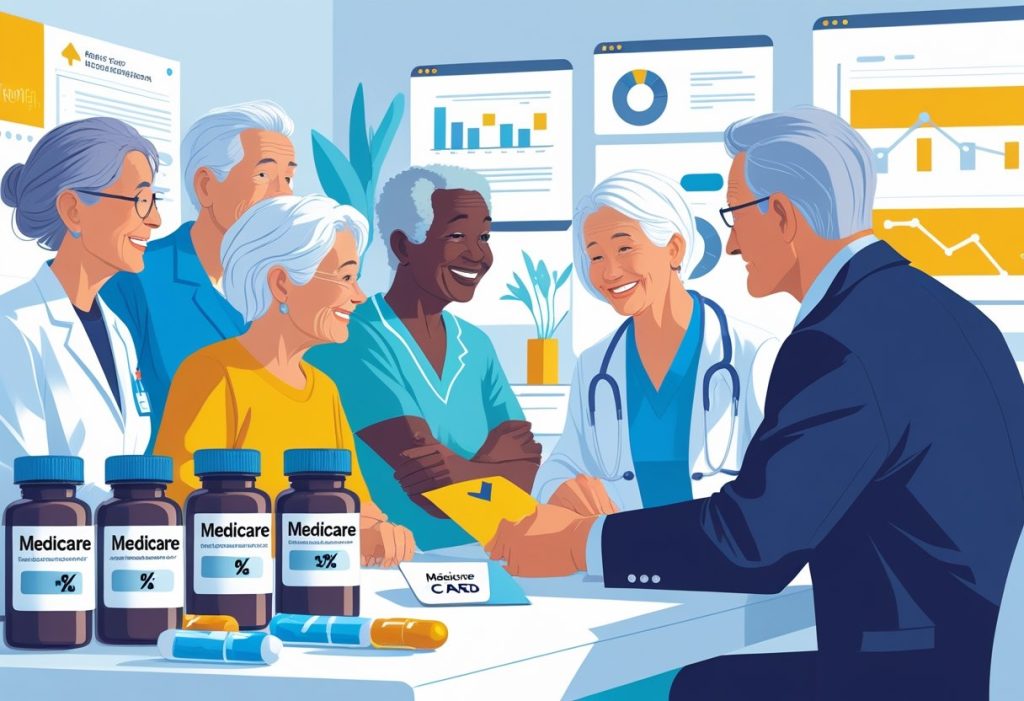Navigating the world of Medicare can be complex, especially when it comes to managing your prescription drug costs. You can significantly lower these expenses by understanding your options and the resources available through Medicare. Many beneficiaries are unaware that programs like Medicare Part D and various assistance initiatives can provide essential financial relief.
At The Modern Medicare Agency, we specialize in helping you find Medicare plans that fit your needs without hidden fees. Our licensed agents are dedicated to working with you one-on-one to identify the best packages tailored to your situation. By taking advantage of these personalized services, you can make informed decisions that could help you save money on your prescriptions.
It’s important to explore strategies that can further ease your out-of-pocket costs. From utilizing approved plans to considering supplemental assistance programs, numerous avenues exist to ensure you don’t pay more than necessary for your medications. Understanding these options is the first step in taking control of your healthcare expenses.
Understanding Medicare Prescription Drug Coverage
Navigating Medicare’s prescription drug coverage can significantly impact your out-of-pocket costs. Understanding the specifics of Medicare Part D and Part B, eligibility requirements, and coverage phases will help you make informed decisions regarding your health insurance options.
Overview of Medicare Part D and Part B
Medicare Part D provides prescription drug coverage. This portion helps you pay for outpatient medications through private insurance companies. It works alongside Original Medicare, which comprises Part A (hospital insurance) and Part B (medical insurance).
Medicare Part B also covers some medications administered in a doctor’s office, though it does not include outpatient prescriptions. For medications, you’ll need a Part D plan. You may face monthly premiums, deductibles, and copayments depending on the plan you choose. Exploring options can lead to cost savings.
Eligibility and Enrollment for Medicare Drug Plans
You are eligible for a Medicare drug plan if you are enrolled in Medicare Part A and/or Part B. Enrollment for Part D drug coverage typically occurs during the Initial Enrollment Period, which is a seven-month period surrounding your 65th birthday.
You can also enroll during the Annual Enrollment Period (October 15 to December 7 each year). During this time, you can change plans or enroll if you didn’t initially. If you miss these windows, you may face late enrollment penalties unless you qualify for a Special Enrollment Period.
Coverage Phases and Benefits
Medicare Part D includes various phases: the deductible phase, initial coverage phase, coverage gap (or “donut hole”), and catastrophic coverage phase.
- Deductible Phase: You pay out-of-pocket costs until you reach your plan’s deductible.
- Initial Coverage Phase: Once you meet the deductible, your plan covers a share of your medication costs—generally, you pay a copayment or coinsurance.
- Coverage Gap: If you exceed certain spending limits, you enter the gap where you pay a higher percentage until reaching catastrophic coverage levels.
- Catastrophic Phase: After spending a specified amount, you pay a minimal coinsurance or copayment for the rest of the year.
For tailored Medicare solutions, consider The Modern Medicare Agency. Our licensed agents work directly with you to identify plans that fit your needs without unexpected costs.
Key Strategies to Lower Prescription Drug Costs with Medicare
Lowering prescription drug costs under Medicare involves strategic choices and informed decisions. By focusing on the right medications, the best pharmacy options, and understanding your plan, you can significantly reduce your out-of-pocket expenses.
Switching to Generic Drugs and Lower-Cost Alternatives
Generic drugs are often a fraction of the cost of brand-name medications. They contain the same active ingredients and are just as effective. You should always ask your doctor if a generic version is available for your prescription.
Utilizing lower-cost alternatives can also help. These may include different formulations or brands that achieve the same health outcomes. Reviewing your options can lead to substantial savings.
Be sure to check if your Medicare plan covers these alternatives, as this can affect your out-of-pocket expenses. The Modern Medicare Agency can assist you in identifying plans that prioritize generic medications, enhancing your affordability.
Utilizing Tiered Formularies and Preferred Pharmacies
Many Medicare Part D plans use tiered formularies, which categorize drugs based on their cost. Typically, Tier 1 includes the lowest-cost options, often generics, while higher tiers contain more expensive brand names.
Choosing drugs from lower tiers can significantly reduce your prescription drug prices. Additionally, many plans offer preferred pharmacies where medications are cheaper. By opting for these pharmacies, you can maximize your savings.
It’s crucial to be aware of your plan’s formulary and pharmacy network. The Modern Medicare Agency helps you navigate these options to find the most cost-effective solutions tailored to your needs.
Maximizing Annual Plan Reviews and Changes
Every year, Medicare beneficiaries have the opportunity to review and change their plans during the Annual Enrollment Period. This is an essential time to assess your current coverage and compare it with available options.
Changes in drug pricing or formulary can occur annually. Assessing these changes can uncover better coverage that fits your medication needs at a lower cost.
The Modern Medicare Agency provides personalized support during this review process. Their licensed agents work with you to identify plans that align with your medication requirements without hidden fees. Taking advantage of annual reviews can lead to meaningful savings on your prescription costs.
Medicare Drug Price Negotiation and Recent Policy Changes
Recent changes to Medicare drug price negotiations aim to provide you with more affordable prescription medication. With new policies in place and initiatives like the Inflation Reduction Act, understanding how these negotiations work can help you save on healthcare costs.
How Medicare Drug Price Negotiation Works
Medicare now has the authority to negotiate drug prices directly with pharmaceutical companies. This is a significant shift aimed at reducing costs for enrollees.
The negotiation process involves selecting high-cost drugs that represent substantial spending under Medicare Part D. The Centers for Medicare & Medicaid Services (CMS) plays a key role in this, ensuring that the negotiated prices reflect a fair value for both patients and taxpayers.
This program plans to gradually expand, increasing the number of drugs subject to negotiation each year. As a result, you can expect to see more affordable options for your prescription needs.
Inflation Reduction Act of 2022 Provisions
The Inflation Reduction Act (IRA) introduced provisions that enhance Medicare’s ability to negotiate prescription drug prices. Specifically, it enables CMS to negotiate prices on a list of selected high-cost medications.
This legislation targets drugs that account for a significant portion of Medicare spending. For example, the first negotiations focus on ten high-cost drugs, with further drugs planned for 2027 and beyond.
Additionally, the IRA includes measures to limit price increases for drugs already covered by Medicare. This protects you from rising costs and helps maintain a sustainable healthcare framework.
Future Expansions and Political Developments
Future expansions of the drug price negotiation program depend heavily on ongoing political dynamics. Under the Biden administration, the emphasis on price negotiation has gained momentum, contrasting previous policies.
As of now, more drugs will be included for negotiation in the upcoming years. This is designed not only to lower costs but also to ensure more transparent pricing in the pharmaceutical industry.
Political support for these initiatives varies. Some prior administrations, including Trump’s, focused on different approaches. As negotiations evolve, keeping informed will help you navigate these changes effectively.
For personalized assistance in understanding your options, consider working with The Modern Medicare Agency. Our licensed agents provide tailored solutions without any hidden fees, ensuring you find the Medicare package that best fits your needs.
Financial Assistance Programs and Cost-Saving Resources
Navigating the costs of prescription drugs can be challenging, but various assistance programs and resources exist to help you manage these expenses effectively. Understanding these options can significantly reduce your out-of-pocket spending and provide financial relief.
Medicare Extra Help (Low-Income Subsidy)
Medicare Extra Help is designed for beneficiaries with limited income and resources. This program assists with costs related to Medicare Part D, including premiums, deductibles, and copayments.
Eligibility is determined by factors such as income and asset limits set by the Social Security Administration. If you qualify, Extra Help can cover most of your prescription costs, making necessary medications more affordable.
To apply, you can visit the Social Security Administration’s website or call them directly. Once enrolled, you will notice significant savings on your out-of-pocket drug expenses.
State and Federal Assistance: Medicaid and CHIP
Medicaid provides health coverage, including prescription drugs, for low-income individuals and families. If you qualify based on income, Medicaid can help mitigate high healthcare costs.
The Children’s Health Insurance Program (CHIP) also supports families with children under 19 who cannot afford health insurance. CHIP covers a wide range of services, including prescriptions, ensuring medical needs are met at low or no cost.
Eligibility requirements vary by state. Therefore, it is essential to check your local Medicaid and CHIP programs for specific information on benefits and enrollment processes.
Non-Governmental Support and Prescription Discount Programs
Numerous non-governmental organizations offer financial assistance for prescription medications. Pharmacies often provide discount programs that lower costs, especially for those without insurance coverage.
Additionally, organizations like The Modern Medicare Agency can guide you towards resources that fit your needs. Our licensed agents can assist in identifying cost-saving options without extra fees, ensuring you find the best prescription coverage available.
These programs can help bridge gaps left by insurance, providing access to necessary medications while minimizing financial strain. Always explore all available resources to enhance your healthcare affordability and accessibility.
Managing Out-of-Pocket Spending and Coverage Gaps
Managing your out-of-pocket spending is essential for effective prescription drug cost control under Medicare. This involves understanding the annual out-of-pocket maximums, navigating coverage gaps, and finding ways to minimize personal spending on medications.
Annual Out-of-Pocket Maximums and Cost Caps
As of 2025, Medicare Part D establishes an annual out-of-pocket maximum for prescription drug costs. This limit caps your total expenses at $2,000, allowing you to plan your finances with greater certainty. If you reach this threshold, your expenditures for covered medications will drop significantly.
Understanding Your Costs:
- TrOOP (True Out-of-Pocket) Costs: These are the costs that count toward your out-of-pocket maximum.
- Estimated Contributions: Typically, Medicare beneficiaries contribute between $3,300 and $3,800 to reach the cap.
Utilizing this information effectively can keep your budgeting for medication more manageable.
Coverage Gap (‘Donut Hole’) Solutions
The coverage gap, often referred to as the “donut hole,” can be a significant concern for Medicare beneficiaries. This phase occurs when you and your plan reach a predetermined limit in prescription drug costs.
Strategies to Navigate the Donut Hole:
- Generics and Preferred Drugs: Opt for generic versions where possible to reduce costs.
- Manufacturer Discounts: Some drug manufacturers provide discounts that can ease out-of-pocket spending during this period.
Recent legislative changes have improved the situation by capping out-of-pocket expenses, providing you with more predictability and less financial burden.
Tips for Reducing Personal Spending on Medications
Reducing your personal spending on medications requires proactive management and resource utilization. Here are actionable tips:
- Compare Prices: Websites and apps allow you to compare drug prices at various pharmacies.
- Use Savings Cards: Programs and discount cards available at many pharmacies can lower your prescription costs.
- Consult Your Agent: Working with a representative from The Modern Medicare Agency gives you access to tailored strategies for Medicare coverage, ensuring you maximize your benefits without hidden fees.
By employing these strategies, you can effectively manage out-of-pocket spending and mitigate the impact of coverage gaps in Medicare.
Broader Impacts on Health Care and Drug Pricing Trends
As prescription drug prices continue to rise, their effects extend beyond individual costs, influencing the overall landscape of healthcare affordability and the dynamics within the U.S. market.
Effects on Healthcare Affordability
Higher prescription drug prices directly impact healthcare affordability, often forcing patients to choose between necessary medications and other essential expenses. Many individuals, including those on Medicare, find that rising costs can lead to medication non-adherence, worsening health outcomes and increasing long-term healthcare expenses.
Additionally, the Affordable Care Act has sought to improve healthcare accessibility, yet fluctuations in drug pricing can undermine these efforts. Patients with chronic conditions may face substantial out-of-pocket expenses, especially when medications are not easily covered. When drug prices are manageable, your overall healthcare costs may decrease, allowing for better health and financial stability.
Impacts of Drug Pricing Policies on the U.S. Market
Drug pricing policies play a crucial role in shaping the U.S. healthcare market. The introduction of measures aimed at negotiating drug prices, such as those initiated under Medicare, has sought to address the imbalance affecting consumers. These policies encourage manufacturers to reconsider pricing strategies to remain competitive.
In this environment, your awareness of available Medicare options is vital. The Modern Medicare Agency can help guide you through these changes, ensuring that you find the best insurance solutions without incurring extra fees. By leveraging expert advice, you can navigate the complexities of drug pricing policies and discover how they impact healthcare access and your financial commitments.
Frequently Asked Questions
Understanding how to manage prescription drug costs under Medicare is essential. The following addresses key questions about reducing out-of-pocket expenses, exploring plan options, and leveraging available resources.
What are the ways to reduce out-of-pocket expenses for Medicare Part D?
You can lower your out-of-pocket expenses for Medicare Part D by choosing a plan with lower premiums and deductibles. Using generic medications instead of brand-name drugs also helps reduce costs significantly. Additionally, utilizing manufacturer discounts and patient assistance programs can further alleviate your financial burden.
Can enrolling in a Medicare Advantage plan lower my medication costs?
Enrolling in a Medicare Advantage plan could lower your medication costs compared to Original Medicare. These plans often include prescription drug coverage and may offer lower co-pays or premiums. It is advisable to compare the benefits and costs of various plans to find one that meets your needs.
What is Extra Help with Medicare Prescription Drug Plan Costs and how does one qualify for it?
Extra Help is a federal program designed to assist people with limited income in paying for Medicare prescription drug costs. To qualify, you must meet specific income and resource limits. Applying for Extra Help through the Social Security Administration can make your medications more affordable.
How does shopping for generic drugs instead of brand-name drugs affect my Medicare costs?
Shopping for generic drugs can significantly decrease your Medicare costs. Generics typically offer the same effectiveness as brand-name drugs but at a lower price. Opting for generics when available can help you maintain your prescriptions while managing your expenses efficiently.
Are there any state programs available that assist with Medicare prescription costs?
Many states offer programs to assist with Medicare prescription costs. These programs can help with premiums, deductibles, or co-pays. Contacting your State Medical Assistance (Medicaid) office can provide you with information on available options in your area.
How can comparing prices at different pharmacies impact the cost of my Medicare prescriptions?
Comparing prices at different pharmacies can lead to significant savings on your Medicare prescriptions. Variations in pricing exist among pharmacies, and some may offer discounts or membership programs. Utilizing online tools to compare prices can help you find the best deal for your medications.
For personalized assistance, The Modern Medicare Agency is a trusted resource. Our licensed agents work directly with you to identify Medicare packages that fit your needs without extra fees, ensuring you receive the best value for your Medicare insurance.






